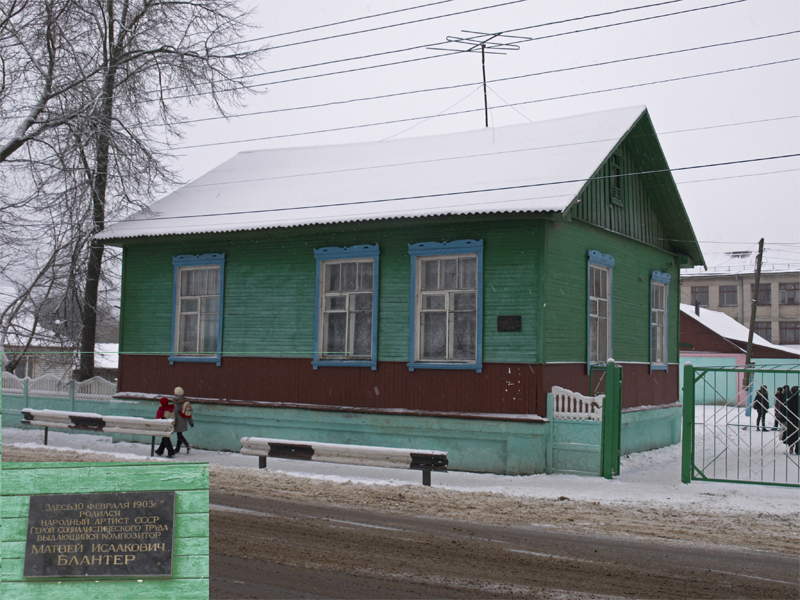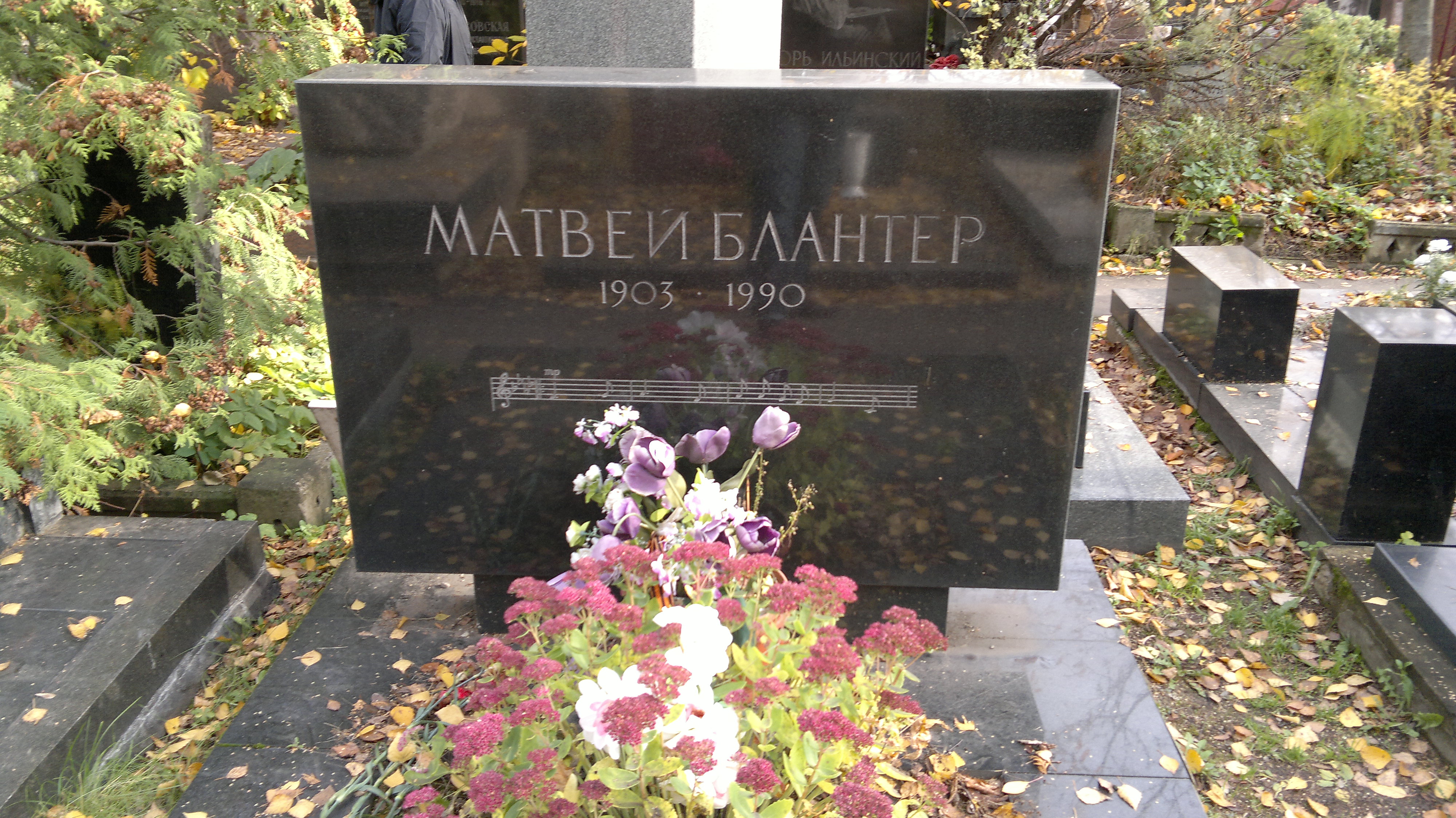Matvey Blanter on:
[Wikipedia]
[Google]
[Amazon]
Matvey Isaakovich Blanter (russian: Матве́й Исаа́кович Бла́нтер) (27 September 1990) was a Soviet composer, and one of the most prominent composers of popular songs and film music in the
 Blanter, the son of a
Blanter, the son of a
 In 1983, Blanter became a member of the
In 1983, Blanter became a member of the
Soviet Union
The Soviet Union,. officially the Union of Soviet Socialist Republics. (USSR),. was a List of former transcontinental countries#Since 1700, transcontinental country that spanned much of Eurasia from 1922 to 1991. A flagship communist state, ...
. Among many other works, he wrote the famous " Katyusha" (1938), performed to this day internationally. He was active as a composer until 1975, producing more than two thousand songs.
Childhood and education
 Blanter, the son of a
Blanter, the son of a Jewish
Jews ( he, יְהוּדִים, , ) or Jewish people are an ethnoreligious group and nation originating from the Israelites Israelite origins and kingdom: "The first act in the long drama of Jewish history is the age of the Israelites""The ...
craftsman, was born in the town of Pochep, then in the Chernigov Governorate
The Chernigov Governorate (russian: Черниговская губерния; translit.: ''Chernigovskaya guberniya''; ), also known as the Government of Chernigov, was a guberniya in the historical Left-bank Ukraine region of the Russian ...
of the Russian Empire
The Russian Empire was an empire and the final period of the Russian monarchy from 1721 to 1917, ruling across large parts of Eurasia. It succeeded the Tsardom of Russia following the Treaty of Nystad, which ended the Great Northern War. ...
. He studied piano and violin at the Kursk
Kursk ( rus, Курск, p=ˈkursk) is a city and the administrative center of Kursk Oblast, Russia, located at the confluence of the Kur, Tuskar, and Seym rivers. The area around Kursk was the site of a turning point in the Soviet–German stru ...
Higher Music School. From 1917 to 1919, he continued his education in Moscow
Moscow ( , US chiefly ; rus, links=no, Москва, r=Moskva, p=mɐskˈva, a=Москва.ogg) is the capital and largest city of Russia. The city stands on the Moskva River in Central Russia, with a population estimated at 13.0 millio ...
, studying violin and composition.
Career
Blanter's first songs were composed in the 1920s. At the time, he wrote light dance and jazz music, including "John Gray" (1923), a foxtrot that became a major hit. In the 1930s, as Soviet culture grew more ideologically strict, Blanter shifted toward writing Soviet propaganda songs. He emerged as one of the creators of the Soviet " mass song". Some of Blanter's 1930s songs were styled after theRed Army
The Workers' and Peasants' Red Army ( Russian: Рабо́че-крестья́нская Кра́сная армия),) often shortened to the Red Army, was the army and air force of the Russian Soviet Federative Socialist Republic and, afte ...
songs of the Russian Civil War
{{Infobox military conflict
, conflict = Russian Civil War
, partof = the Russian Revolution and the aftermath of World War I
, image =
, caption = Clockwise from top left:
{{flatlist,
*Soldiers ...
(1918–1921) and mythologized the war's Bolshevik heroes. The most famous among these are "The Song of Shchors" (1935), telling the tale of Ukrainian Red Army commander Nikolai Shchors
Mykola Oleksandrovich Shchors ( uk, Микола Олександрович Щорс; – 30 August 1919) was a Ukrainian communist. He served as Red Army commander, member of the Russian Communist Party, renowned for his personal courage duri ...
, and "Partisan Zheleznyak" (1936), which combines the energetic rhythms of a military marching song with elements of a mournful ballad as it describes Commander Zheleznyak's heroic death in battle (the song opens and closes with a stanza about Zheleznyak's lonely burial mound in the steppes).
Other notable Blanter songs from that period include "Youth" (1937), a cheerful marching song asserting that "right now, everyone is young in our young, beautiful country"; "Stalin Is Our Battle-Glory" (1937), a widely performed hymn to Joseph Stalin
Joseph Vissarionovich Stalin (born Ioseb Besarionis dze Jughashvili; – 5 March 1953) was a Georgian revolutionary and Soviet political leader who led the Soviet Union from 1924 until his death in 1953. He held power as General Secretar ...
; and "The Football March" (1938), music from which is still performed at the start of every football match in Russia.
In 1938, Blanter began his long-lasting collaboration with the poet Mikhail Isakovsky. Their first song, undoubtedly the most famous of Blanter's works, was the world-renowned " Katyusha". In it, Blanter combined elements of the heroic, upbeat battle song and of a peasant song representing a woman's lamentation for an absent lover. Standing on a high riverbank, a young woman, Katyusha, sings of her beloved (compared to "a gray eagle of the steppes"), who is far away serving on the Soviet border. The theme of the song is that the soldier will protect the Motherland and its people while his girl will preserve their love. While the song is joyful and filled with the imagery of a fertile, blooming land, it also conveys the sense that the motherland is under threat. "Katyusha" gained fame during World War II
World War II or the Second World War, often abbreviated as WWII or WW2, was a world war that lasted from 1939 to 1945. It involved the vast majority of the world's countries—including all of the great powers—forming two opposing ...
as an inspiration to defend one's land from the enemy.
In 1937, Pravda
''Pravda'' ( rus, Правда, p=ˈpravdə, a=Ru-правда.ogg, "Truth") is a Russian broadsheet newspaper, and was the official newspaper of the Communist Party of the Soviet Union, when it was one of the most influential papers in the ...
published a request for thousands of Soviet girls to go to work in the far east of the county, to help construct military defences. Blanter was commissioned to write the highly-popular operetta ''On the Bank of the Amur River'' to celebrate the initiative: the premiere took place at Moscow Operetta Theatre in 1939, and the work was broadcast by Moscow Radio as well as taken up by operatic companies throughout the country.
Blanter accompanied the Red Army to Berlin in early 1945. He was commissioned by Stalin to compose a symphony about the capture of Berlin. However, when Vasily Chuikov
Vasily Ivanovich Chuikov (russian: link=no, Васи́лий Ива́нович Чуйко́в; ; – 18 March 1982) was a Soviet military commander and Marshal of the Soviet Union. He is best known for commanding the 62nd Army which saw h ...
was meeting with a German delegation led by Hans Krebs to negotiate their surrender following Hitler's suicide, Chuikov had several uniformed war correspondents pretend to be members of his general staff in order to appear more professional and intimidating at the negotiations. But Blanter was also meeting with Chuikov at the time the delegation arrived and he could not pass as a Red Army officer as he was wearing civilian clothes. Thus, Chuikov shoved him into a closet just before the delegate entered the room. While he remained there for most of the conference, he eventually lapsed into unconsciousness from a lack of air, collapsing out of the closet and into the room just as the delegates were preparing to leave, embarrassing Chuikov and astonishing the Germans.
Blanter wrote several other highly popular wartime songs. His 1945 song, "The Enemy Burned Down His Home", about a soldier who returns from the front to find his entire family dead, became controversial when the authorities deemed it too pessimistic and banned its performance; it was performed for the first time in 1961.
Blanter's postwar songs include "The Migratory Birds Are Flying" (1949), a patriotic Soviet song in which the narrator watches migratory birds fly away and asserts that he can think of no better place to be than the Motherland, and "Dark-Eyed Cossack Girl" (Russian
Russian(s) refers to anything related to Russia, including:
*Russians (, ''russkiye''), an ethnic group of the East Slavic peoples, primarily living in Russia and neighboring countries
*Rossiyane (), Russian language term for all citizens and peo ...
: Черноглазая казачка), written especially for the bass-baritone Leonid Kharitonov.
 In 1983, Blanter became a member of the
In 1983, Blanter became a member of the Anti-Zionist Committee of the Soviet Public
The Anti-Zionist Committee of the Soviet Public (russian: Антисионистский комитет советской общественности, ''Antisionistsky komitet sovyetskoy obshchestvennosti''; abbreviated AZCSP russian: АКСО) w ...
, an organization created by the Soviet Union as an anti-Zionist propaganda tool. He died in Moscow
Moscow ( , US chiefly ; rus, links=no, Москва, r=Moskva, p=mɐskˈva, a=Москва.ogg) is the capital and largest city of Russia. The city stands on the Moskva River in Central Russia, with a population estimated at 13.0 millio ...
in 1990.
Awards and honors
*Stalin Prize Stalin Prize may refer to:
* The State Stalin Prize in science and engineering and in arts, awarded 1941 to 1954, later known as the USSR State Prize
The USSR State Prize (russian: links=no, Государственная премия СССР, ...
(1946) (for the songs "Under the Balkan Stars", "In a way, a path far", "My beloved", "In the forest, front-line")
* People's Artist of the RSFSR
People's Artist of the RSFSR (russian: Народный артист РСФСР, ''Narodnyj artist RSFSR'') was an honorary title granted to Soviet Union artists, including theatre and film directors, choreographers, music performers, and orchest ...
(1965)
* Order of the Badge of Honour
The Order of the Badge of Honour (russian: орден «Знак Почёта», orden "Znak Pochyota") was a civilian award of the Soviet Union.
It was established on 25 November 1935, and was conferred on citizens of the USSR for outstanding ...
(1967)
* People's Artist of the USSR (1975)
* Hero of Socialist Labour (1983)
References in popular culture
Ayn Rand's 1936 novel ''We the Living
''We the Living'' is the debut novel of the Russian American novelist Ayn Rand. It is a story of life in post-revolutionary Russia and was Rand's first statement against communism. Rand observes in the foreword that ''We the Living'' was the cl ...
'', set in Petrograd between 1923 and 1925, has a passage devoted to the huge popularity of "John Gray."
In the 1966 novel ''The Last Battle'',Ryan, Cornelius. ''The Last Battle.'' London: Collins, 1966. Cornelius Ryan
Cornelius Ryan (5 June 1920 – 23 November 1974) was an Irish-American journalist and author known mainly for writing popular military history. He was especially known for his histories of World War II events: '' The Longest Day: 6 June 1944 D- ...
records that Blanter accompanied the Red Army
The Workers' and Peasants' Red Army ( Russian: Рабо́че-крестья́нская Кра́сная армия),) often shortened to the Red Army, was the army and air force of the Russian Soviet Federative Socialist Republic and, afte ...
into Berlin during the last days of the war and the collapse of Nazi
Nazism ( ; german: Nazismus), the common name in English for National Socialism (german: Nationalsozialismus, ), is the far-right totalitarian political ideology and practices associated with Adolf Hitler and the Nazi Party (NSDAP) in ...
power.
In the 2004 film, '' Downfall'', Blanter plays a small role and is portrayed by Boris Schwarzmann. In the film, he is stuffed into the closet of Vasily Chuikov's office, who is in a rush to meet the Nazi general, Hans Krebs.
References
{{DEFAULTSORT:Blanter, Matvey 1903 births 1990 deaths Anti-Zionist Jews People from Pochepsky District People from Mglinsky Uyezd Russian Jews Soviet Jews Jewish composers Jewish songwriters Jewish socialists Heroes of Socialist Labour People's Artists of the USSR People's Artists of the RSFSR Stalin Prize winners Recipients of the Order of Lenin Burials at Novodevichy Cemetery